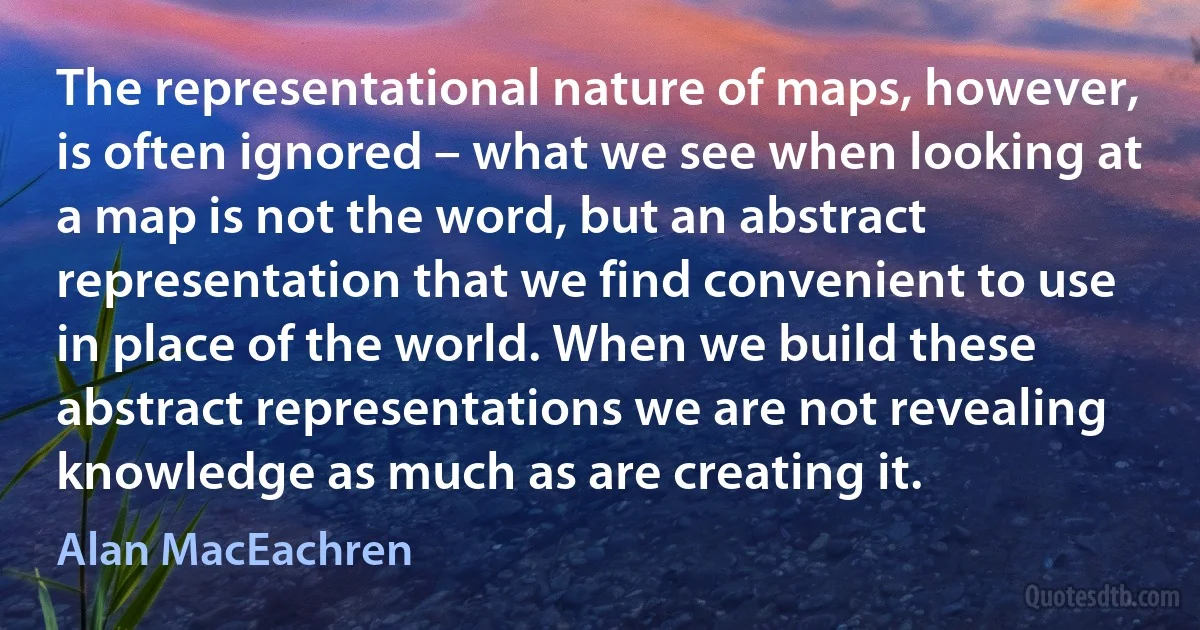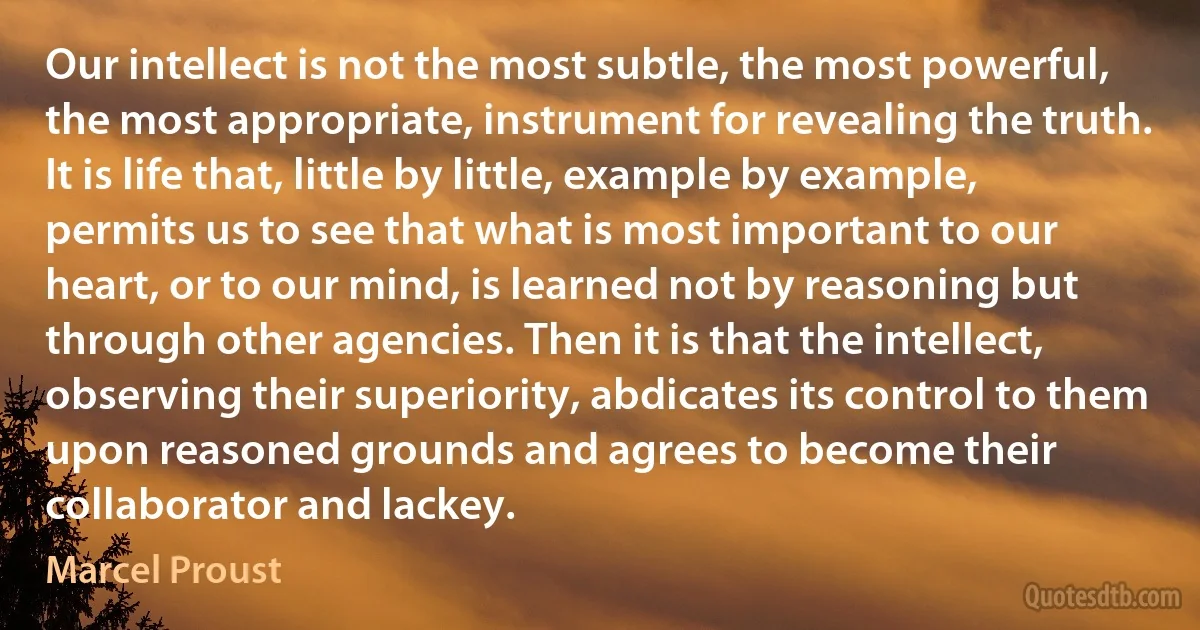Revealing Quotes - page 7
‘Writers don't so much write about their own lives as create them, Barthes said; it's an oddly modern idea. Bengalis, similarly, had to make their own history. They did it in houses, tenements, and in neighbourhoods connected by stifling alleys that are no wider than a small room ... And this is why I feel, even now, that the most revealing places in Calcutta are not the museums or the great monuments ... but the houses and lanes in which people live.'

Amit Chaudhuri
The U. S. officials are now revealing their true nature. In his recent speech, the U. S. president spoke like a person who is thirsty for the blood of human beings! He threatened and leveled baseless accusations against other governments and nations. Considering the existing realities on the ground, most of the nations in the world have now come to the conclusion that the U. S. is really the Great Satan. This belief is also substantiated by concrete evidence.

Ali Khamenei
For I consider that the sufferings of the present time do not amount to anything in comparison with the glory that is going to be revealed in us. For the creation is waiting with eager expectation for the revealing of the sons of God. For the creation was subjected to futility, not by its own will, but through the one who subjected it, on the basis of hope that the creation itself will also be set free from enslavement to corruption and have the glorious freedom of the children of God. For we know that all creation keeps on groaning together and being in pain together until now.

Paul
The Vision of the Image composed of four Metals was given first to Nebuchadnezzar, and then to Daniel in a dream: and Daniel began then to be celebrated for revealing of secrets, Ezek. xxviii. 3. The Vision of the four Beasts, and of the Son of man coming in the clouds of heaven, was also given to Daniel in a dream. That of the Ram and the He-Goat appeared to him in the day time, when he was by the bank of the river Ulay; and was explained to him by the prophetic Angel Gabriel. It concerns the Prince of the host, and the Prince of Princes: and now in the first year of Darius the Mede over Babylon, the same prophetic Angel appears to Daniel again, and explains to him what is meant by the Son of man, by the Prince of the host, and the Prince of Princes.

Isaac Newton
God is resplendently reflected in the souls of His chosen ones, and these pure souls, these images of God, like the transparent glass, shine forth like gold in the sun, like diamonds of the purest water, but they shine for God and the angels, not revealing their brightness to men, although at times, by God's ordering, they do shine even for them, by the light of their faith, their virtues, when necessary, similar to a candle put on a candlestick in a room, and lighting the room with all those who are in it. (cf. Mt. 5:15).

John of Kronstadt
Symbol and myth do bring into awareness infantile, archaic dreads and similar primitive psychic content. This is their regressive aspect. But they also bring out new meaning, new forms, and disclose a reality that was literally not present before, a reality that is not merely subjective but has a second pole which is outside ourselves. This is the progressive side of symbol and myth. This aspect points ahead. It is integrative. It is a progressive revealing of structure in our relation to nature and our own existence, as the French philosopher Paul Ricoeur so well states. It is a road to universals beyond discrete personal experience.

Rollo May
These are stories, then, about Man and Nature. We've been telling ourselves such stories forever, as a way of making sense of what we call our "relationship to nature”-to borrow that curious, revealing phrase. (What other species can even be said to have a "relationship” to nature?) For a long time now, the Man in these stories has gazed at Nature across a gulf of awe or mystery or shame. Even when the tenor of these narratives changes, as it has over time, the gulf remains. There's the old heroic story, where Man is at war with Nature; the romantic version, where Man merges spiritually with Nature (usually with some help from the pathetic fallacy); and, more recently, the environmental morality tale, in which Nature pays Man back for his transgressions, usually in the coin of disaster-three different narratives (at least), yet all of them share a premise we know to be false, but can't seem to shake: that we somehow stand outside, or apart from, nature.

Michael Pollan
No one could complain about it, or moan for the good old days, without revealing nostalgia for a heroic age that had not actually been heroic-or, along with heroic, had also been suppressed, limited, inconvenient and dangerous. No, Nirgal had no desire for nostalgia-the meaning of life lay not in the past but in the present, not in resistance but in expression.

Kim Stanley Robinson
Friedrich Bessel... achieved a breakthrough. Please hold your thumb at arm's length and alternate closing your left and right eyes a few times. ...[Y]our thumb appears to jump left and right by a certain angle relative to the background... [M]ove your thumb closer... and you'll see this jump angle growing. Astronomers call this jump angle parallax... [W]e can... compare telescopic photographs taken six months apart, when Earth is on opposite sides of the Sun. ...Bessel noticed ...61 Cygni ...moved a tiny angle, revealing its distance to be almost a million times that to the Sun... Now that Bessel knew the distance he used... [the] inverse-square law to figure out how luminous it was... in the same ballpark as the Sun... Giordano Bruno had been right after all!

Max Tegmark
The task was to combine the two [ Paul Cézanne's dialectical method revealing the process of seeing - Courbet by his materialism]. Followed up separately, each would lead to a cul-de-sac: Courbet's materialism would become mechanical; the force of gravity, which gave such dignity to his subjects, would become oppressive and literal. Cézanne's dialectic would become more and more disembodied and its harmony would be obtained at the price of physical indifference. Today, both examples are followed up separately.

Gustave Courbet
The real purpose of state secrecy is to enable governments to establish their own self-interested and often mendacious version of the truth by the careful selection of "facts” to be passed on to the public. They feel enraged by any revelation of what they really know, or by any alternative source of information. Such threats to their control of the news agenda must be suppressed where possible and, where not, those responsible must be pursued and punished.
Revealing important information about the Yemen war – in which at least 70,000 people have been killed – is the reason why the US government is persecuting both Assange and Zikry.

Julian Assange



